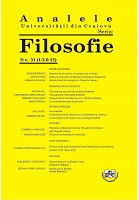RAPOTUL DINTRE FERICIRE ȘI CUNOAȘTERE LA ARISTOTEL
RELATIONSHIP BETWEEN HAPPINESS AND KNOWLEDGE IN ARISTOTLE
Author(s): Ionuț RăduicăSubject(s): History of Philosophy, Epistemology, Ancient Philosphy
Published by: Editura Universitaria Craiova
Keywords: Aristotle; inclusivism; intellectualism; happiness;
Summary/Abstract: In this article I describe the argumentative structure, where Aristotle reached at the two contradictory definitions of happiness (εὐδαιμονία): 1) the happiness is supreme good, an activity correlated to virtues (intellectual and moral); 2) the happiness is based on contemplation and wisdom. In this article we will demonstrate that both definitions are not contradictory, and the solution proposed by us stands on an analogy with Aristotle’s Physics, where the Stagirite matches the causes to idea (the phenomena) of motion (κίνησις), so that the motion’s finality to contain both the anteriority and the posteriority. Similar to this idea, the supreme happiness (which is the contemplation), hold its anteriority. By our point of view, there is proposed an interpretation, where the later in neither detached by its constitutive anterior body, nor its explicit manifestation. More precisely, through the analytic scale, all its parts are permanently connected, even is seems that its diachronic interpretation as a phenomena suggests the surpassing of some points. In reality, the historical and value surpassing of some stages (as, for example, the moral virtues to contemplation, as it is suggested on the latter part of Nicomachean Ethics), affirmed also by Aristotle’s adepts, is considered by us abusive, unspecific to Nicomachean Ethics or to Aristotle’s philosophy. The solution is based on the inclusivist view, but with mention that the perfected happiness has an open structure, which is able to infirm the need of practical manifestation, for instance. It results that the both critical visions are not – not entirely, at least – opposite to each other.
Journal: ANALELE UNIVERSITĂȚII DIN CRAIOVA. SERIA FILOSOFIE
- Issue Year: 1/2013
- Issue No: 31
- Page Range: 5-15
- Page Count: 11
- Language: Romanian

